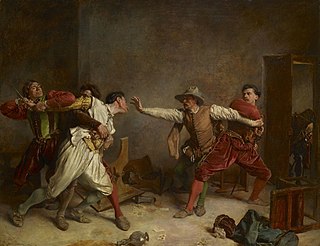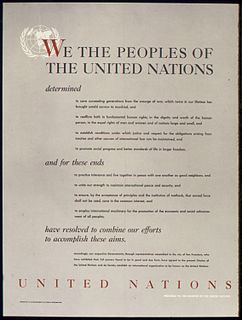 W
WIn law, abandonment is the relinquishment, giving up or renunciation of an interest, claim, civil proceedings, appeal, privilege, possession, or right, especially with the intent of never again resuming or reasserting it. Such intentional action may take the form of a discontinuance or a waiver. This broad meaning has a number of applications in different branches of law. In common law jurisdictions, both common law abandonment and statutory abandonment of property may be recognized.
 W
WAn adequate remedy or adequate remedy at law is part of a legal remedy which the court deems satisfactory, without recourse to an equitable remedy. This consideration expresses to the court whether money should be awarded or a court order should be decreed.. Adequate remedy at law refers to the sufficient compensation for the loss or damages caused by the defendant with a proper monetary award. The court must grant the adequacy of remedy that will lead to a "meaningful hearing". Whether legal damages or equitable relief are requested depends largely on,whether or not the remedy can be valued. Both two elements, compensation and the meaningfulness of hearing, provide a proper way to have an adequate remedy. The word "meaningfulness" of hearing in the law process is the assumption that the defendant compensated must be meaningful for the injured party where the defendant made a fully covered compensation for all the losses. Hence, the hearing in which cannot give any right amount of compensation award or settlement is not "meaningful", and the unavailability of the compensation will lead to an inadequate remedy. The adequate remedy at law is the legal remedies by meaning it is satisfactory compensation by way of monetary damages without granting equitable remedies.
 W
WIn many legal jurisdictions related to English common law, affray is a public order offence consisting of the fighting of one or more persons in a public place to the terror of ordinary people. Depending on their actions, and the laws of the prevailing jurisdiction, those engaged in an affray may also render themselves liable to prosecution for assault, unlawful assembly, or riot; if so, it is for one of these offences that they are usually charged.
 W
WArbitration, a form of alternative dispute resolution (ADR), is a way to resolve disputes outside the judiciary courts. The dispute will be decided by one or more persons, which renders the 'arbitration award'. An arbitration decision or award is legally binding on both sides and enforceable in the courts, unless all parties stipulate that the arbitration process and decision are non-binding.
 W
WArraignment is a formal reading of a criminal charging document in the presence of the defendant, to inform them of the charges against them. In response to arraignment, the accused is expected to enter a plea. Acceptable pleas vary among jurisdictions, but they generally include "guilty", "not guilty", and the peremptory pleas setting out reasons why a trial cannot proceed. Pleas of "nolo contendere" and the "Alford plea" are allowed in some circumstances.
 W
WA banker's lien is a legal right arise in many common law jurisdictions of a bank to exercise a lien over any property in the custody of the bank as security for the indebtedness of the customer to the bank.
 W
WA blunt instrument is any solid object used as a weapon, which damages its target by applying direct mechanical force, and has no penetrating point or edge, or is wielded so that the point or edge is not the part of the weapon that inflicts the injury. Blunt instruments may be contrasted with edged weapons, which inflict injury by cutting or stabbing, or projectile weapons, where the projectiles, such as bullets or arrows, are accelerated to a damaging speed.
 W
WButts and bounds, shortened form for "abuttals and boundaries" of a property, are the boundary lines delineated between plots of land, usually those which define the end of an estate, as used in legal deeds, titles, etc. These are usually descriptive features in the property, such as trees, outcroppings of stone, or riverine brooks, etc., and are signified in the legal deed for purposes of identification.
 W
WCestui que is a shortened version of cestui a que use le feoffment fuit fait, literally, the person for whose use/benefit the feoffment was made, in modern terms a beneficiary. It is a Law French phrase of medieval English invention, which appears in the legal phrases cestui que trust, cestui que use, or cestui que vie. In contemporary English the phrase is also commonly pronounced "setty-kay" or "sesty-kay". According to Roebuck, Cestui que use is pronounced. Cestui que use and cestui que trust are often interchangeable. In some medieval documents it is seen as cestui a que. In formal legal discourse it is often used to refer to the relative novelty of a trust itself, before that English term became acceptable.
 W
WIn law, cross-examination is the interrogation of a witness called by one's opponent. It is preceded by direct examination and may be followed by a redirect. Redirect examination, performed by the attorney or pro se individual who performed the direct examination, clarifies the witness' testimony provided during cross-examination including any subject matter raised during cross-examination but not discussed during direct examination. Recross examination addresses the witness' testimony discussed in redirect by the opponent. Depending on the judge's discretion, opponents are allowed multiple opportunities to redirect and recross examine witnesses.
 W
WThe word foral is a noun derived from the Portuguese word foro, ultimately from Latin forum, equivalent to Spanish fuero, Galician foro, Catalan fur and Basque foru.
 W
WFuero, Fur, Foro or Foru is a Spanish legal term and concept. The word comes from Latin forum, an open space used as a market, tribunal and meeting place. The same Latin root is the origin of the French terms for and foire, and the Portuguese terms foro and foral; all of these words have related, but somewhat different, meanings.
 W
WIn civil and property law, hotchpot is the blending, combining or offsetting of property to ensure equality of a later division of property.
 W
WInsult is the infringement of another human's honor by whatsoever means of expression, in particular an offensive statement or gesture communicated, and is a crime in some countries. In a few countries seen as the same, in most the distinction between insult and defamation is that, from a focusing point of view, the former ascribes a value whereas the latter attributes or imputes a fact.
 W
WIssuer is a legal entity that develops, registers, and sells securities for the purpose of financing its operations.
 W
WMischief or malicious mischief is the specific name for different criminal offenses in a number of different jurisdictions. While the wrongful acts will often involve what is popularly described as vandalism, there can be a legal differentiation between the two. The etymology of the word comes from Old French meschief, which means "misfortune", from meschever, "to end badly".
 W
WIn English law, natural justice is technical terminology for the rule against bias and the right to a fair hearing. While the term natural justice is often retained as a general concept, it has largely been replaced and extended by the general "duty to act fairly".
 W
WNota bene is a Latin phrase which first appeared in English writing c. 1711. Often abbreviated as NB, n.b., or with the ligature , the phrase is Latin for "note well." In Modern English, it is used, particularly in legal papers, to draw the attention of the reader to a certain (side) aspect or detail of the subject being addressed. While NB is also often used in academic writing, note is a common substitute.
 W
WParole is the early release of a prisoner who agrees to abide by certain conditions, originating from the French word "parole". The term became associated during the Middle Ages with the release of prisoners who gave their word.
 W
WPeon usually refers to a person subject to peonage: any form of wage labor in which a laborer (peon) has little control over employment conditions. Peon and peonage can refer to both the colonial period and post-colonial period of Latin America as well as the period after the end of slavery in the United States, when "Black Codes" were passed to retain African American freedmen as labor through other means.
 W
WIn common law jurisdictions, a personal representative or legal personal representative is a person appointed by a court to administer the estate of another person. If the estate being administered is that of a deceased person, the personal representative is either an executor if the deceased person left a will or an administrator of an intestate estate. In other situations, the personal representative may be a guardian or trustee, or other position. As a fiduciary, a personal representative has the duties of loyalty, candor or honesty, and good faith. In the United States, punctilio of honor, or the highest standard of honor, is the level of scrupulousness that a fiduciary must abide by.
 W
WA position of trust is any position that requires its holder to enjoy the trust of those who elected or chose the holder. It is often used in a more restricted sense defined by an organization or by legislation.
 W
WA preamble is an introductory and expressionary statement in a document that explains the document's purpose and underlying philosophy. When applied to the opening paragraphs of a statute, it may recite historical facts pertinent to the subject of the statute. It is distinct from the long title or enacting formula of a law.
 W
WProbate is the judicial process whereby a will is "proved" in a court of law and accepted as a valid public document that is the true last testament of the deceased, or whereby the estate is settled according to the laws of intestacy in the state of residence of the deceased at time of death in the absence of a legal will.
 W
WA proclamation is an official declaration issued by a person of authority to make certain announcements known. Proclamations are currently used within the governing framework of some nations and are usually issued in the name of the head of state.
 W
WRemand, also known as pre-trial detention, preventive detention, or provisional detention, is the process of detaining a person until their trial after they have been arrested and charged with an offense. A person who is on remand is held in a prison or detention centre or held under house arrest. Varying terminology is used, but "remand" is generally used in common law jurisdictions and "preventive detention" elsewhere, However, in the United States, "remand" is rare except in official documents and "kept in custody until trial" is used in the media and even by judges and lawyers in addressing the public. Detention before charge is referred to as custody and continued detention after conviction is referred to as imprisonment.
 W
WRoyal assent is the method by which a monarch formally approves an act of the legislature, either directly or through an official acting on the monarch's behalf. In some jurisdictions, royal assent is equivalent to promulgation, while in others that is a separate step. Under a modern constitutional monarchy, royal assent is considered little more than a formality. Even in nations such as the United Kingdom, Norway and Liechtenstein which still, in theory, permit their Monarch to withhold assent to laws, the Monarch almost never does so, except in a dire political emergency or on advice of government. While the power to veto by withholding royal assent was once exercised often by European monarchs, such an occurrence has been very rare since the eighteenth century.
 W
WIn law, sex characteristics refers to an attribute defined for the purposes of protecting individuals from discrimination due to their sexual features. The attribute of sex characteristics was first defined in national law in Malta, in 2015. The legal term has since been adopted by United Nations, European, and Asia-Pacific institutions, and in a 2017 update to the Yogyakarta Principles on the application of international human rights law in relation to sexual orientation, gender identity, gender expression and sex characteristics.
 W
WA tax lien is a lien imposed by law upon a property to secure the payment of taxes. A tax lien may be imposed for delinquent taxes owed on real property or personal property, or as a result of failure to pay income taxes or other taxes.
 W
WA testamentary trust is a trust which arises upon the death of the testator, and which is specified in his or her will. A will may contain more than one testamentary trust, and may address all or any portion of the estate.
 W
WTracing is a legal process, not a remedy, by which a claimant demonstrates what has happened to his/her property, identifies its proceeds and those persons who have handled or received them, and asks the court to award a proprietary remedy in respect of the property, or an asset substituted for the original property or its proceeds. Tracing allows transmission of legal claims from the original assets to either the proceeds of sale of the assets or new substituted assets.
 W
WIn law, a verdict is the formal finding of fact made by a jury on matters or questions submitted to the jury by a judge. In a bench trial, the judge's decision near the end of the trial is simply referred to as a finding. In England and Wales, a coroner's findings used to be called verdicts but are, since 2009, called conclusions.
 W
WA voluntary group or union is a group of individuals who enter into an agreement, usually as volunteers, to form a body to accomplish a purpose. Common examples include trade associations, trade unions, learned societies, professional associations, and environmental groups.